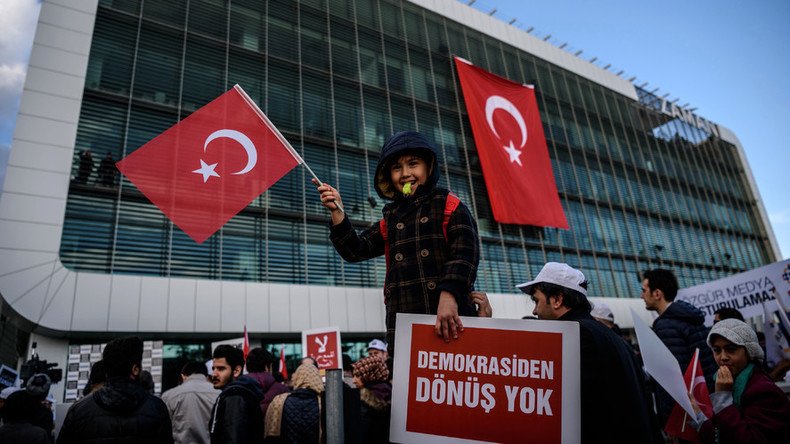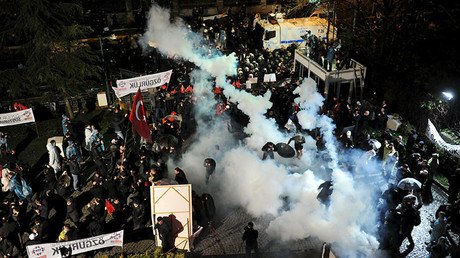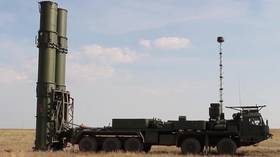'US won't pressure NATO member Turkey over dictatorial behavior'

As police used water cannon and tear gas to disperse crowds protesting outside the headquarters of the opposition Zaman newspaper in Istanbul on Friday, RT discussed with experts media persecutions in Turkey.
READ MORE: RT reporter teargassed in Istanbul as Zaman ‘take-over’ protest enters 2nd day
RT: With the latest takeover of an opposition media source, why has such force been used in the situation like this?
Gerry Sussman, professor from Toulan School of Urban Studies and Planning: It appears that it is just another act of repression against the media in Turkey, it is a pattern. It is called an ‘insult case’ where the opposition is treated as insulting as if it is a personal relationship between the media and President Erdogan. And that doesn’t speak well of what purports to be a democracy. And what immediately strikes me about it is the double standard with which the US and British press and their respective governments are treating Turkey vis-à-vis how they treat, for example, Russia and President Putin. This double standard is really outstanding.
And the broader implication is the coalition of forces that the US has organized on its side versus the coalition of forces that Russia has contributed to with Syria and Iran and Lebanon. And this is the way in which this is characterized: the Putin government and President Putin himself is disrespected in most of the American media and in the political sphere - including the leading political candidates for presidential office for this year. And it is just striking how they have this disrespectful regard for the President of Russia, but really have a hands-off or just not paying attention whatsoever to what’s going on in Turkey. So, that is really what stands out. As to what precisely is going on… It is clearly not representative of what anybody would consider a serious democracy. The media, of course, is really important and it also suggests that the court system in Turkey apparently has no regard for the free press.
Richard Becker, anti-war activist, told RT: “On the one hand, we have this action by the Turkish government against the newspaper that has been critical of Erdogan and is being taken over and apparently its editorial policy changed in a pro-Erdogan direction. And on the other, we have a statement coming from the State Department that they find this ‘troubling.’ Of course, this is just for PR purposes, nothing will really change, Turkey is considered by Washington and the Pentagon to be a critical ally.”
RT: It's not the first opposition newspaper to be oppressed by the government. Why is Turkey systematically pursuing them?
GS: It is obvious that they will not tolerate an opposition. If the Western press were looking at this in a normal way, they would say that this is an act of a dictatorial type of leadership, not that of a democracy. That should be very clear and that should raise really serious questions about American and NATO’s relationship with a country that disregards the fundamentals of a free press and of democracy.
RT: The US State Department has criticized Turkey's actions today. Will Turkey take heed?
GS: My expectation is that they are not going to listen to the US unless there is a lot of pressure. And I don’t think the presidential administration is going to put a lot of pressure, just like they don’t put a lot of pressure on other recalcitrant allies that repress the media. Just sort of a public statement perhaps by the president of the US, President Obama and that would be the end of it. But I don’t think Turkey is going to pay much attention to it and I think that gradually countries in the Middle East are pulling away from US influence. I think it speaks to the really limited power and influence that the US actually has over the region. But it raises more fundamental questions about US relations with Turkey and about the whole constitution of that alliance structure of Turkey with Saudi Arabia, with the Gulf States… I think these are the larger questions that it is going to invoke in the political process. I don’t think you are going to hear much about this really in a critical way, certainly not from the Republican candidates for office this year, or from somebody like Hillary Clinton who has been known to be quite hawkish on US foreign policy - more so than even President Obama. I don’t think the US will act aggressively and try to put pressure on the Turkish government. And that will be a clear signal to the Erdogan government and him personally that he can do what he wants and the US will remain faithful allies the way they are with other repressive regimes in the region.
Yuksel Serindag, a member of the Kurdish American Society, commented on Turkish government’s crackdown on Zaman newspaper: “This is one of the main newspapers in Turkey which has links to the Gulen society [a pacifist pro-Islam movement], whose cleric head lives in the US. I think this is the last leg of the crackdown on that society. They have been cracking down on their followers among the police and judiciary, but now it is the Gulen’s media.”
RT: Do you see this as another example of Erdogan cracking down on the freedom of speech?
Ajamu Baraka, human rights activist: Of course, it is. It is another outrageous incident brought about by the Turkish authorities. It is something that has been unfolding in that country or intensifying since last Sunday. It is clearly the continuation of an ongoing human rights crisis in Turkey. There is no justification for cracking down on a newspaper, for limiting free speech. But we have seen over the last half a year or more that Erdogan is committed to undermining democracy and eliminating all expressions of opposition.
RT: What could be done now to alleviate the problems with the press in Turkey?
AB: I think there needs to be a consistent loud voice coming from the nations that pretend to be the upholders of democracy and human rights. Basically, Turkey being a friend of the West, and the West that pretends to uphold democracy, those states should roundly condemn this latest incident. But we see that even the US government says they are ‘troubled’ by what happened in Turkey. But the real troubling aspect of this is that Western nations have allowed Turkey, the Saudis, and for themselves to operate above international law. So, what we see with the Erdogan regime is basically a new configuration in terms of the complete rejection of the constraints of international law when it comes to a state or a government or a party attempting to advance its particular interest.
Ronald Suny, professor of Social and Political History at the University of Michigan, said: “It seems to be at the moment in Turkey a concerted effort by the Erdogan government to end the democratic reforms that that government in fact instituted some 10 years ago. This is an incredibly dangerous move on their part because it is leading to a kind of civil war situation in Turkey.”
RT: The US State department has issued some critical comments about Erdogan. What is your view on that? Experts say there were too superficial.
AB: I agree with that assessment that basically they were superficial that if the US authorities were really opposed to the crackdown on democracy in Turkey, they would make their positions well-known. But we see that not only do we have the crackdown against a newspaper, we see this increasing militarization of life in Turkey - including the militarization taking place on the border between Turkey and Syria. And we have to put this in context. One of the reasons why Erdogan regime is cracking down on dissent is because of the massive opposition the many citizens in Turkey have regarding its policies in Syria.
The statements, views and opinions expressed in this column are solely those of the author and do not necessarily represent those of RT.













